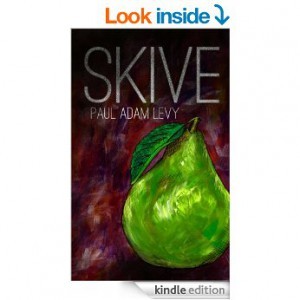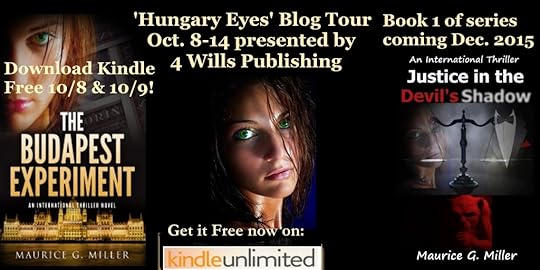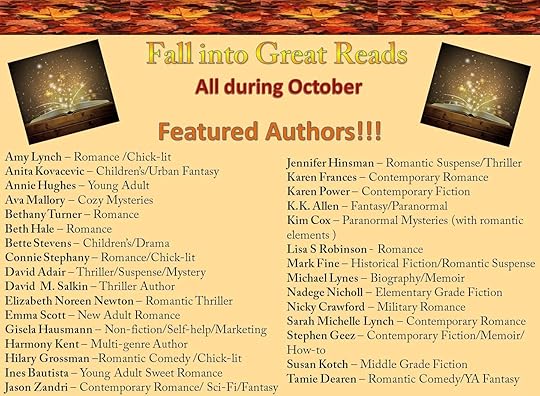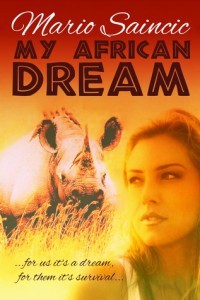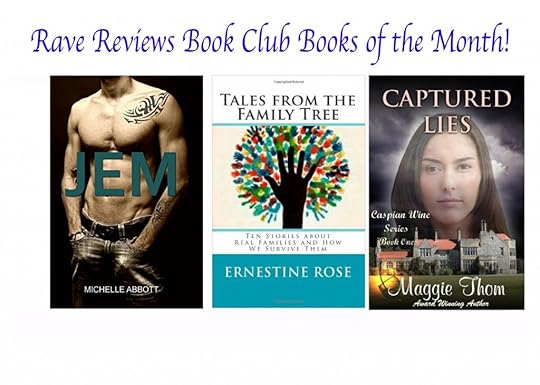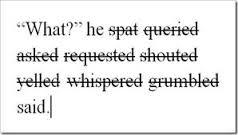Harmony Kent's Blog, page 139
October 9, 2015
First Five Friday 10/07
When writing a novel, authors are advised to make the first five lines pop. These are what need to catch the reader’s attention from the get go. So, each Friday, I shall share with you the first five lines from a book that caught my attention, and then I’ll do a bit of show and tell, where I make up Five First Lines on the spot. Feel free to comment, and leave Five Lines of your own!  If you have read a book where the opening lines impressed you, please do share! For any books I post on First Five Friday, you will find the UK Amazon link in the title link, and the US Amazon link by clicking on the book cover.
If you have read a book where the opening lines impressed you, please do share! For any books I post on First Five Friday, you will find the UK Amazon link in the title link, and the US Amazon link by clicking on the book cover.
Last week we looked at First Five Lines from Zoe Cannon. This week we have the opening lines from Daydream’s Daughter, Nightmare’s Friend by Author Nonnie Jules.
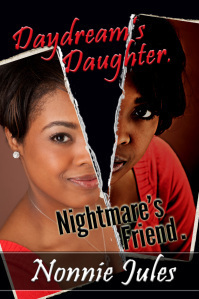 Birds singing. The sun trying to find her perfect spot on the horizon. Marisa still sitting in bed after another sleepless night. This was the order of all her mornings. As she looked down on Walter’s sleeping face, a sadness washed over her as it always did when the memories of her awful secrets invaded her thoughts.
Birds singing. The sun trying to find her perfect spot on the horizon. Marisa still sitting in bed after another sleepless night. This was the order of all her mornings. As she looked down on Walter’s sleeping face, a sadness washed over her as it always did when the memories of her awful secrets invaded her thoughts.
In these opening lines, the contrast between the peaceful setting and the turmoil within Marisa is brilliant. Immediately, the reader wants to know what awful secrets the woman has. In just these five lines, the author has laid out the premise for the story and pulled the reader into Marisa’s world.
The best books lure you inside, and then slam the door shut behind you.
Okay, time for me to write Five First Lines for today:
When you lie, your right eye twitches. Always has. What are you trying to hide? Don’t lie to me. Because I know. I always know.
Thanks for stopping by! Be sure to come lurk in my lair next Friday, where we’ll have more Five First Lines! 
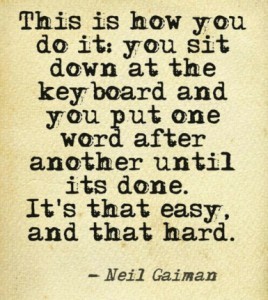 Find Harmony’s books on Amazon UK and Amazon US
Find Harmony’s books on Amazon UK and Amazon US






 by
by 
TRB Review: Skive
Skive
BY PAUL ADAM LEVY
Black Comedy
Reviewed on behalf of The Review Board by Harmony Kent.
I received a free MOBI copy of this book, in exchange for an honest review.
Alexander is a dysfunctional young man, disillusioned with his life. After ten years working in the warehouse of a supermarket, he is offered an automatic promotion, at which he completely freaks out. This sets off a chain of events which sees him homeless and staggering from one event to another with no rhyme or reason.
I found this character so unmemorable, I had to go back and look up his name to write this review. I failed to connect with him on any level, and had no sympathy whatsoever for his plight. Remarkable, considering the whole book revolves around this character—his thoughts, his emotions, and his reactions. He is so dysfunctional, in fact, that no logic can be found within his responses or thoughts—I would say ‘reasoning’ but there really wasn’t any.
That’s not to say that I didn’t relate to his awful personal situation: I did. His dead-end job, lonely, single home life, rundown studio flat, and no hope … but none of this explains his (dare I say) borderline mental health issues. He’s not the only guy to have been in this position, but it would be a dire world indeed if they all spiralled so out of control like he did just because they got offered a promotion they didn’t particularly want.
As you will have guessed, this all made it an arduous enough read for me, but then we get into the technical hiccups that added to the burden. The writing style is passive in the extreme. I lost count of the number of sentences with words missing. Spelling mistakes abound, and comma usage is erratic at best. Incorrect words are used, such as ‘moral’ instead of ‘morale’, ‘discrete’ instead of ‘discreet’, and ‘carefree’ being treated as two separate words. I could go on. Exclamation marks are chronically overused, as is delaying the action unnecessarily by using ‘began to’ and ‘started to’. Split infinitives pepper the prose, as does telling instead of showing.
While the plot does include unexpected events, the main character’s reactions to them are all too predictable. At one point, pages have been given over to showing how hungry he is, and then with the first pound he receives, he blows it in an internet café—so, obviously not quite that deleriously hungry after all. Believe me, if he was all that starved, he would have bought something edible with even that small amount of money, such as a bag or crisps or a chocolate bar—anything that contained calories.
I give this book 5 out of 10 TRB stars, which equates to 2.5 out of 5 stars on other rating scales.






 by
by 
October 7, 2015
Hungary Eyes
First, I would like to thank my gracious host for giving me the privilege to guest blog here on the first stop of my weeklong tour. Also, a debt of gratitude to 4 Wills Publishing for organizing all this. The tour runs today through October 14th. If you are interested in continuing with me on the tour stops (and I know you will), just click here for the dates and locations, and don’t forget to bookmark the page. Thanks!
I thought it a good idea to start the tour off by acquainting everyone with my debut novel “The Budapest Experiment.” I’ll be providing a glimpse inside the writing of the book, as well as offering a glance into my “author” personality. Last month I did my first ever author interview on Cheryl Holloway’s blog that I thoroughly enjoyed, and would like to share. Please be sure to leave comments/questions/feedback at the end of the post, they are much appreciated. Here we go….
Can you sum up your book in 20 words or less?
A captivating thriller that weaves business, politics, seduction, power, and religion into a compelling tale of international intrigue.
Since this is an international thriller, where do your ideas come from? Do you have a standard formula for plots or do stories come to you as a whole concept?
As this is my first novel, I cannot say that I have a “standard formula” for plots, at least not yet. But I can say that even as a child I had quite a vivid imagination and was adept at storytelling. It is these qualities that I believe shaped my visions in writing this book. The scenes and dialogue came to me almost as if I was writing a screenplay. This particular story and concept had been brewing in my head since the early 1990’s and I’ve finally put it into print.
I did invest in Scrivener author software to help with the organization and plot development of the sequel that’s currently in progress. It is going to be a three book series, so I am hoping this tool will help with arranging the large array of characters and scenes in the best logical order. We’ll see how it goes.
What is different and exciting that you bring to your readers through your suspenseful writing?
I would dare to say that this book does not reflect your typical storyline and plot. It is a thriller incorporated into historical fiction that reminds us of the political, social, and economic outcomes of the late 1980’s, and early 1990’s. While these events took place a quarter of a century ago, it is amazing to realize how they have impacted our lives and major world events here in the 21st century. Even today, we see Russia trying to reclaim and form alliances with former Soviet Bloc countries, playing out a game of international “tug of war” with the West on the world stage.
I did take some time, as the book begins, constructing the background and character of Michael, the protagonist, and then worked toward immersing the reader into his skin. For the sake of realism, there had to be a compelling story behind how an American consultant could become involved with the Russian Mob. Confronted with business, personal, and financial challenges whose solutions come with a multitude of moral and philosophical dilemmas, Michael is riddled with guilt and betrayal. Add in the benefits, dangers, and intrigue of being linked with the ‘Organization’, the story is designed to keep readers on edge and ultimately implore them to consider “At what price would I sell my soul?”
Where are you from? Does your background have any influence on this book?
I grew up in New England, but this had no impact with regard to the setting and plot of the book. Although, I do include scenes in Boston and its suburbs, being the protagonist’s ‘home base.’
The story was born of my experiences in the early 1990’s. One of my entrepreneurial ventures led me to working as a trade consultant in Hungary. At that time, the country was transitioning from a state to market economy and offered many business opportunities.
In the nearly 3 years that I travelled there I met lots of ‘interesting’ characters in both business and political arenas. The Budapest night life could get quite crazy at times if your ‘meetings’ and social engagements led you to certain places. Conversations would get quite interesting as my Hungarian colleagues and I would be ‘playing games with the faces’, as Simon and Garfunkle would put it, letting our imaginations go wild. As an example, my Hungarian associates would look at a table that was living it up big time in a crowded room and say, ‘That guy is a lieutenant with the Mob’ or ‘That dancer he’s with is one of the Organization’s women.’ It was these real life experiences that had the biggest influence on the creation of The Budapest Experiment.
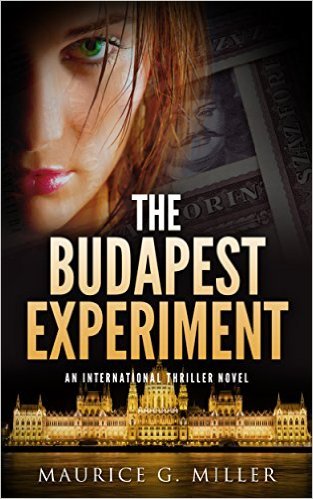 This book is about the Russian Mafia, the Organization as you refer to them in the book. Did you find anything challenging while writing this book?
This book is about the Russian Mafia, the Organization as you refer to them in the book. Did you find anything challenging while writing this book?
As a young adult, two great movies came across the silver screen that really stuck with me, The Godfather in 1972 and Jaws in 1975. Despite all the violence and bloodshed, I think The Godfather went a long way toward romanticizing Organized Crime with the general public. Seems like there will always be an attraction to those with power and wealth, regardless of the methodologies they used to procure their status.
In the book, the Mob serves as the vehicle to Michael’s newfound wealth, while at the same time providing a glimpse into the darker side of their operations. This triggers the internal conflicts that confront him and give pause for readers to consider how they would handle these dilemmas.
Not really knowing much about the Russian Mafia, it was somewhat of a challenge to write. Along with some research, I combined my real life experiences in Hungary with what I’ve seen in some of the more famous mafia movies to create and develop the ‘mob’ characters and scenes. There are several references to ‘The Godfather’ movie in the book.
Another challenge I faced was writing the erotica scenes. My decision to include these was a bit of a struggle. I considered ‘glazing over’ these scenes, but in the end felt it important to capture the intimacy between Michael, the ‘Mob Women’ assigned to make him happy, and a flirty interpreter. My hope was that by including the details of these encounters, readers would better comprehend and assess the internal conflicts of the main character, and also familarize themselves with the ‘behind the scenes’, and sometimes tragic, life stories of the Mob women he encounters.
Why did you decide to write this book?
Many in my family and in the business world have often told me that I had good writing skills. I had this story on the back burner for quite a while, always thinking about writing a novel, but never following through. Oddly enough, it was the sensation of 50 Shades and E.L. James that was the final motivating factor.
After hearing all the ‘buzz’, I decided to read the book. When finished, I kind of understood why the book took off but felt, ‘Hey my story is more compelling than, and as sexy as this one…’ Then I discovered self-publishing was now an option for authors. After lots of research on the industry and being an entrepreneur at heart, I launched myself into it. Not alone in these notions, many new emerging authors have brought the self-publishing industry to what it is today.
Did you have to do any special research to write this book?
I did do some, but not an extensive amount, of research into the Russian Mob of the late 1980’s and early 90’s. As an MBA, what I did learn was quite fascinating from a business perspective. In the book, I do get into quite a bit of detail regarding the Mob’s overall plan for enhancing their financial positions in Eastern Europe and beyond during this time of tumultuous change and its impact on the world as a whole.
The real research came more on the self-publishing, promoting, and marketing stages of the process.
Was it hard creating believable situations and issues or did you take them from real life and elaborate?
The latter is true, for the most part, through the first eight or so chapters of the book and also in some instances later on. For the 100% fictional parts, I believe I succeeded in creating realistic and believable dialogue and scenes, though often hampered with the challenge of using ‘second hand’ English for international characters. Yes, I can say it was difficult at times.
Readers will not help but notice there are some ‘unbelievable’ situations that continue to perplex the protagonist, like ‘Why has the Organization found such favor in me?’ And ‘Am I being setup?’
Which character was hardest to write? Which character was easiest to write?
By far, the easiest character to write was the protagonist, Michael. It was easy because surprisingly (*he says jokingly*) he shared a lot of the same traits as I did back then, even though most of his experiences in Budapest are quite different than what mine were.
The most difficult was the character of the villan, Laszlo Toth, a member of the Mob with a drug (cocaine) issue, who without giving too much of the book away, becomes a villan to both Michael and the Organization. I definitely need some more experience and work on creating and developing villanous characters.
How long did it take you to write this book?
The Budapest Experiment is a rather long novel with 451 print pages on a 6×9 paperback book template and over 150,000 words. It took me about 13 months to write. I do have a full time job that pays the bills, so the writing was done on a part time basis.
What really surprised me was the length of time (4 months) it took between finishing the writing of the manuscript to the publishing date. I did have professional editing and book cover done, and spent a good amount of time doing some rewrites, building my author platform, and doing pre-launch promo before the publishing date.
What kind of feedback are you getting from readers of the book?
The most common feedback I have received from my readers is that the book kept them on edge, and that the ending left them wanting more, which I take as a very high compliment. The Amazon and Goodreads reviews I have obtained so far have been very positive and encouraging. As a new author, feedback and reviews are the bloodline we live on, not only to bring added exposure to our work, but to help emerging authors evaluate and improve their writing skills.
I would strongly encourage your audience to post reviews for their favorite books penned by indie authors to show them support.
Thanks so much for taking your time to read this post. I would love to hear your feedback/questions/comments.
On the next tour stop I will be providing an excerpt from the book that is not available through the “Look Inside” feature on the book’s Amazon page. This excerpt will chronicle Michael’s first ‘Organization’ meeting and a face to face dialogue with ‘The Boss’, the powerful leader and brainpower behind the Mob, running its operations, for now, out of Budapest. Hope you will joins us for that.
In celebration of the first few stops on the tour, the Kindle version of The Budapest Experiment is available for download FREE October 8th and 9th. Just click on the Amazon page link below.
http://www.mauricegmiller.com/
http://www.amazon.com/dp/B00WHA3J0E
Author Bio
 Maurice has been involved in the creative arts since his teenage years. Having worked and played in rock/blues bands for most of his adult life, the artistic role models that he came to admire were those authors, musicians, and philosophers that wrote the books, poetry, lyrics, and music that touched and moved the souls of generations. Counted among his favorites authors are J.D. Salinger, Earnest Hemingway, Dante Alighieri, and Kahlil Gibran. Deciding to take a break from the music career, he has rededicated his creative energies toward writing.
Maurice has been involved in the creative arts since his teenage years. Having worked and played in rock/blues bands for most of his adult life, the artistic role models that he came to admire were those authors, musicians, and philosophers that wrote the books, poetry, lyrics, and music that touched and moved the souls of generations. Counted among his favorites authors are J.D. Salinger, Earnest Hemingway, Dante Alighieri, and Kahlil Gibran. Deciding to take a break from the music career, he has rededicated his creative energies toward writing.
Then there is the “business geek” side of him. With an MBA degree, and having started several ventures, he has an obsession for creating new business ideas, digging into data analytics, and dissecting statistics. This passion for entrepreneurship is reflected prominently in his writing style.
Maurice’s debut fictional novel, “The Budapest Experiment”, an international thriller, was released on May 25, 2015 and is available now on Amazon.
Lots more can be found, including book info, social media contacts, and blog posts, at: http://www.mauricegmiller.com
Links
Web Site: http://www.mauricegmiller.com
Email: mauricegmiller@yahoo.com
Amazon Page: http://smarturl.it/budapestexp
Twitter: https://twitter.com/mauricegmiller @mauricegmiller
Goodreads: http://bit.ly/1DO6y6k
Facebook: http://on.fb.me/1ESXMYv
Pinterest: https://www.pinterest.com/MauriceGMiller/
Google +: http://bit.ly/1N1Jmdv
The Budapest Experiment – Synopsis
At what price would you sell your soul…?
This captivating thriller weaves business, politics, seduction, power, and religion all into a compelling tale of international intrigue.
Set in 1991, during the dawn of the Post-Communist era in Hungary, this novel chronicles the exploits of Michael, an adventurous but struggling American entrepreneur.
During this period of tumultuous political, economic, and social change, the Russian Mob is taking advantage of the ensuing turmoil to entrench itself deeper into the business landscape of the former Soviet Bloc countries.
Navigating through the streets of Budapest, Michael immediately senses an air of mysticism and lurking danger. After a few successes and trials, a series of business dealings leads him to a consulting position with the ‘Organization’.
Seduced by their women, money, and power, Michael becomes entangled in the web of Mob culture. Digging into his conscience, he encounters a spirit ravaged with feelings of guilt and betrayal, but a rapidly growing bank account serves as the means to justify his actions.
Pondering his future, Michael wonders if he can balance this extreme Budapest lifestyle with his ‘ordinary’ family life back home. After padding his wallet for the past several months, would the Organization let him just walk away, or would there be consequences?
This book is intended for mature audiences.






 by
by 
October 2, 2015
First Five Friday
When writing a novel, authors are advised to make the first five lines pop. These are what need to catch the reader’s attention from the get go. So, each Friday, I shall share with you the first five lines from a book that caught my attention, and then I’ll do a bit of show and tell, where I make up Five First Lines on the spot. Feel free to comment, and leave Five Lines of your own!  If you have read a book where the opening lines impressed you, please do share! For any books I post on First Five Friday, you will find the UK Amazon link in the title link, and the US Amazon link by clicking on the book cover.
If you have read a book where the opening lines impressed you, please do share! For any books I post on First Five Friday, you will find the UK Amazon link in the title link, and the US Amazon link by clicking on the book cover.
These Five Lines are from The Torturer’s Daughter by Zoe Cannon:
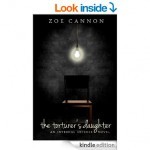 Becca’s steps slowed as she approached Processing 117. The floodlights of the parking lot shone down on her, exposing her. Past the lot, the darkness threatened to close in. There was no other source of light nearby except for the dim glow of the streetlamps, nothing but trees for at least a mile in every direction. The concrete structure loomed taller than its five stories–maybe because of the invisible presence of the underground levels, or maybe because in a moment Becca was going to have to walk inside.
Becca’s steps slowed as she approached Processing 117. The floodlights of the parking lot shone down on her, exposing her. Past the lot, the darkness threatened to close in. There was no other source of light nearby except for the dim glow of the streetlamps, nothing but trees for at least a mile in every direction. The concrete structure loomed taller than its five stories–maybe because of the invisible presence of the underground levels, or maybe because in a moment Becca was going to have to walk inside.
I love these because they set the scene succinctly, and the final eight words ‘Becca was going to have to walk inside‘ ramp up the tension. Immediately, I am left with a question: What waits inside? What is Processing 117, and what’s so scary about it? In just Five Lines, the author has invited the reader into her world.
The best books lure you inside, and then slam the door shut behind you.
Okay, time for me to write Five First Lines for today:
The answer is yes. I will marry you. But before you make that commitment, you should know something about me. My name isn’t Mary. And I don’t work in a bank.
Thanks for stopping by! Be sure to come lurk in my lair next Friday, where we’ll have more Five First Lines! 
 Find Harmony’s books on Amazon UK and Amazon US
Find Harmony’s books on Amazon UK and Amazon US
She’s on Twitter: @harmony_kent and Facebook.






 by
by 
October 1, 2015
Fall into Great Reads is here!
Be sure to head on over to A Word With Traci now! Don’t miss this awesome tour, where you’ll find new favourite authors and books!







 by
by 
September 29, 2015
TRB Review: My African Dream
BY MARIO SAINCIC
Romantic Suspense
Reviewed on behalf of The Review Board by Harmony Kent.
I received a free PDF copy of this book, in exchange for an honest review.
Millicent Cramer lives a boring, unfulfilling life in Texas. She has never left Texas, let alone travelled abroad. Her sister keeps trying to set her up on blind dates, but Millicent’s heart just isn’t in it. Then, on a whim, she signs up for an online competition to win three months at a game reserve in deepest, darkest Africa. Millie never could have guessed the danger both her body and her heart would encounter on the trip of a lifetime. She wanted excitement and a fresh start, and that is exactly what she gets in Kulindwa.
The plot, pacing, character development, and word building are all done very well, and this would definitely have been a five star read if not for all the spelling errors and impossible dialogue tags. Smiled and Scowled should never be used as dialogue tags, as they are actions (beats) not a way of speaking. Basic errors are made like putting ‘main’ instead of ‘mane’, ‘site’ instead of ‘sight’ ‘weary’ instead of ‘wary’, ‘UV line’ instead of ‘IV line”, etc. Also more than a few sentences have missing words. The writing tends toward the passive style and could be tightened up. One big annoyance was the use of ‘yip’ instead of ‘yep’. Had this been used for one character, as a character trait, I wouldn’t have noticed it so much and would have found this a good device for the author to use. However, every single character, no matter their nationality or location, use this form and it just sticks out like a sore thumb so much that it leads me to wonder if this is yet another misspelling. Another thing that could be done away with are phrases like the following: I thought to myself … who else are we going to think to but ourselves? Unless it’s a book about mind readers, this is a given and could simply be ‘I thought’. Having said that, as this is in first person, the monologue doesn’t even need this kind of tag—we’re already in the character’s head.
Okay, gripes aside, I loved this book. I adored it, in fact. And other than the above, it would be up there on my top reads. This is so frustrating, as this author has talent, in spades. It kept me gripped and I read it in no time. It had me cringing, sitting on the edge of my seat, and laughing aloud aplenty. It did its job: it dragged me off my sofa and into Africa for a wild ride.
I give a soft8 out of 10 TRB stars, which translates into 4 out of 5 stars on other rating scales.






 by
by 
September 22, 2015
Fall into Great Reads
Catch all these awesome authors all through October on A Word With Traci !
31 Days!
31 Authors!
Multiple Genres!
*Thrillers
*Romance
*Sci-Fi
*Mystery/Suspense
*Children’s
*Non-fiction/Self-help
*Historical Fiction
*Paranormal/Fantasy
Fantastic Prizes!
Every day in October! A Word with Traci. See you there! 
September 7, 2015
RRBC Books of the Month!
Congratulations to September Books of the Month!
Michelle Abbott
http://www.amazon.com/dp/B00U65KU22
Ernestine Rose
http://www.amazon.com/dp/B00AC89HZ4
Maggie Thom
http://www.amazon.com/dp/B009RPTFIC
Have a great month!







 by
by 
September 4, 2015
To Hell and Gone
Reviewed on behalf of The Review Board 
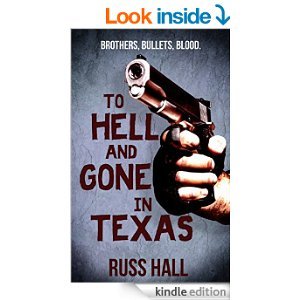 BY RUSS HALL
BY RUSS HALL
Crime Thriller
I received a free mobi copy of this book, in exchange for an honest review.
Al is a retired detective who is pulled back into business when someone makes an attempt on his estranged brother’s life. Various agencies join the fun in this crime thriller, and soon things escalate way beyond anything Al or the Sheriff’s department could have foreseen. We have shoot outs aplenty, helicopter chases, and a romantic thread that has nothing to do with Maury, Al’s rake of a brother.
This book has all the elements of an exciting and rip-roaring read. Unfortunately, it didn’t do it for me. The characters felt too one dimensional, and the crises all seemed to resolve themselves way too easily. Characters appeared to have been killed, only to end up being resurrected again. The plot didn’t have any twists or turns for me to get my teeth into, and is more of a shoot-em-up kind of a book.
The writing could be tightened up, with much fewer delaying actions (overusing “began tos” and “started tos”), less filter words (he knew/heard/saw/etc.). It is also passive in nature with the use of “wases” and “weres”, etc. Certain stock phrases are overused, such as “pretty much”, as is the word “own”. All of this made it a more tedious read than it needed to be.
One of my pet hates is descriptive dialogue tags that tell instead of show, or worse still, tell what is already shown. Some real humdingers can be found in this book, like: Bonnie bubbled on, and: she gushed.
All of that said, the plot is cohesive and the pacing good. The characters could be padded out more, but they are believable enough.
This book gets 7 out of 10 TRB stars, which translates into 3.5 out of 5 stars on other rating scales.






 by
by 
And the winners are …
Prize Winners for this stop!
1st Place
Bette A Stevens: $5 Amazon Gift Card!
2nd Place
Natalie Ducey: e-book copy of Finding Katie!
3rd Place
Tara Fairfield: ebook copy of Slices of Soul!
4th Place
Jan Hawke: paperback copy of Polish Your Prose!
5th Place
Steven Kay: paperback copy of Slices of Soul!
Congratulations to all of you! I have your email addresses and will contact you shortly. Thank you to everyone who stopped by and left comments. 
I’ll see you at the next stops of this awesome BOOK & BLOG BLOCK PARTY!






 by
by 

